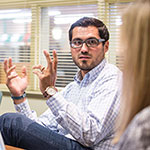By Ann Robinson
Mario Avila received his MBA from Vanderbilt three years ago, but when he returned to the school in late July as director of the new Turner Family Center for Social Ventures, it seemed—at least for a moment—that no time had passed.
Avila says stepping back in the school brought a flood of memories of the long days and late nights he clocked while earning his degree. Perhaps it’s a good thing he can still put himself in the students’ shoes. In turn, budding social entrepreneurs would be well-served to follow his example.
After getting his bachelor’s degree at Dartmouth College in 2004, Avila went to work in talent management at Campbell & Company, a national consulting firm headquartered in Chicago that focuses on nonprofit clients. His deep interest in microfinance and the role it can play in alleviating poverty led him to seek out business school.
“I came to Vanderbilt with the notion of starting a business focused on helping people gain access to the right types of financial products to start to build their credit history,” Avila says. He developed his idea with guidance from Bart Victor, the Cal Turner Professor of Moral Leadership and founding director of Project Pyramid; Jim Schorr, adjunct professor of management and CEO of the national Social Enterprise Alliance; and Germain Böer, professor of accounting, emeritus, and director of the Owen Entrepreneurship Center.
“These faculty members helped me understand how to make sure you’re measuring your business growth as well as your social impact—how you start to do those metrics,” Avila says.
In addition to serving as president of the Owen Student Government Association and as a member of the Latin Business Association’s executive board, Avila was a project management intern for Project Pyramid, the trans-institutional Vanderbilt student-run program dedicated to ending global poverty. Working in Guatemala, he helped design and implement housing solutions for more than 150 families. He received the school’s 2011 Clarcor Leadership Award, which recognizes students for having a positive impact on the Owen community, and was named a fellow of the Cal Turner Program for Moral Leadership in the Professions for 2011-12—all the while working on his own social venture.
Avila enlisted a dozen Vanderbilt classmates to work on various projects for his business. He also received a coveted Sohr Grant, a $25,000 award for Vanderbilt MBA student startups underwritten by AIM Healthcare co-founder Jim Sohr, BE’86, MBA’90, and his wife, Leah. Avila used it all to form Contigo Financial, a socially responsible consumer lender headquartered in Nashville. In under a year, Contigo was acquired by Emerge Financial Wellness, and Avila became CEO of Emerge, in charge of leading the organization’s strategic vision, mission and social impact.
When he was tapped to serve as the inaugural director of the Turner Family Center for Social Ventures, Avila knew he could rely on his Owen experience for his new role.
“I’m not far removed from my time at Vanderbilt or from how I interacted with my classmates across the different schools—some of whom I ended up hiring,” he says. “I hope to help the current batch of students as they continue to build the Turner Family Center and help other departments within the university gain a better understanding of what social enterprise is and how business truly can drive social change.”
In addition to matching students with opportunities, the new center will provide a valuable consistency to social enterprise work at Vanderbilt, Avila says.
“Project Pyramid put us on the map—it got students excited about the work,” he says. “The Turner Family Center for Social Ventures will be the consistent thread that ties together the knowledge and experience acquired by students from year to year.”
Avila hopes the center accomplishes something else as well.
“Social ventures can be difficult work because you’re addressing some of the toughest issues,” he says. “So I’ve told the students, ‘Let’s have fun. Not only are we building sustainable organizations that are doing really good things and making an impact, but let’s have fun while doing it.’
“Making money while doing good is fun—a lot of fun,” he says.
